
Summer Survey 2020: The Results
The pandemic has affected everyone in very different ways, and as CLAPA looked ahead to an uncertain future, there was one thing we knew for sure: to better support the UK cleft community, we needed to know more about how you’d been affected.
In July, we launched our 2020 Summer Survey which asked respondents about their general cleft-related concerns over the past few months, their experiences of remote cleft care, and finally about how we could support them both now and in the future.
Since August, the results of this survey have been guiding our work and we’re continuing to put plans in place to tackle some of the issues you’ve raised. In this report, we want to share some of these results and our plans with you.
Who Took Part?
268 people affected by cleft responded to our survey, including 157 parents and carers, 91 adults (18+), and 10 young people (16-17).
Of the parents and carers, 35% had a child aged 1-4 years, and 30% had a child aged 5-11 years. 12.5% had a child aged under 6 months, including a few who had yet to be born.
The geographic spread of participants was roughly in line with the UK population, with the largest region (35%) being South East England.
Just over ¾ of participants (or their children) were receiving treatment from a local Cleft Team.
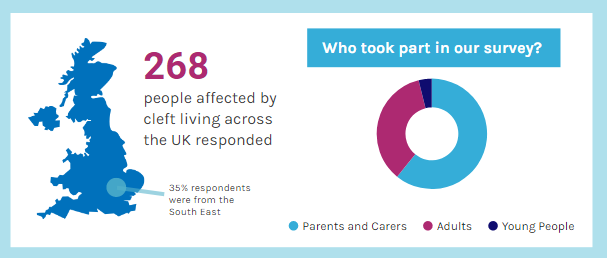
Key Concerns
We’d heard from many people throughout lockdown about their cleft-related concerns, and we wanted to get a snapshot of which of these concerns were most important to our community at the moment. We asked respondents to read a list of concerns we’d heard about since the start of lockdown, and pick up to four which mattered most to them. Parents/carers and people born with a cleft were given separate lists to pick from to make sure these were relevant.
Parents and carers top concerns:
- My child’s appointment(s) being cancelled/postponed (48%)
- My child’s ongoing treatment (e.g. speech and language therapy) being compromised (31%)
- My child’s emotional wellbeing/mental health (23%)
- My child’s surgery being cancelled/postponed (21%)
Given how Cleft Teams have been affected by the pandemic, it was unsurprising that most families were worried about the knock-on impact of delayed appointments and treatments, including the impact this had on their child. The concerns parents and carers had also changed depending on the age of their child. Parents and carers of children under 12 months were also concerned about their or their partner’s emotional wellbeing and, for those with young babies, many of whom will have been born just before or during lockdown, there was a worry about online or remote appointments not being as effective.
Parents and carers of older children were more likely to be concerned about their child’s emotional wellbeing and mental health, with this being particularly high for parents and carers of teenagers.
CLAPA’s Response
Certainty is hard to get right now, but we’re doing what we can to keep our COVID hub updated and share any updates with our community. Recently, we held an online Q&A with a cleft surgeon and a parent volunteer on the subject of ‘Cleft Surgery in a COVID’ world to help our community understand how things are working within Cleft Teams at the moment and how they are likely to change moving forward.
We’re also looking to share stories from parents and carers who have had their children and/or had their child’s repair surgery during lockdown, as we think it’s vital to share and preserve these unique perspectives. If you’d like to share your story, please email [email protected] and we can arrange this with you in whatever way you’re comfortable with.
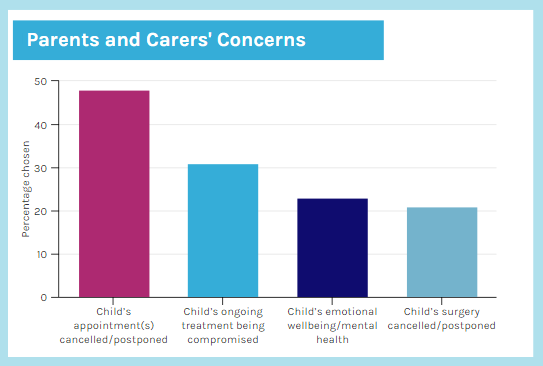
Adults & Young People’s Top Concerns
- Issues with breathing when wearing a face covering (e.g. mask) (33%)
- My (or my partner’s) emotional wellbeing/mental health (28%)
- Others understanding my (or my partner’s) speech when wearing a face covering (e.g. mask) (24%)
- Other appointment(s) being cancelled/postponed (24%)
CLAPA’s Response
We’ve already updated our COVID hub with information on face coverings, and will continue to seek out and publish answers to the most important questions. Our Peer Support Service is always available for adults hoping to talk to others with similar experiences, as well as our other adult support services. With adult elective surgeries being postponed to allow the Cleft Teams to catch up on more urgent cases, we aren’t yet sure when things will get back to ‘normal’, but we’ll keep monitoring the situation and will be sure to share updates and resources as soon as these become available. This issue was addressed towards the end of our recent Q&A, and we may look at this in more detail in a future event, e.g. exploring treatment options for adults who have been out of the cleft service for a long time.
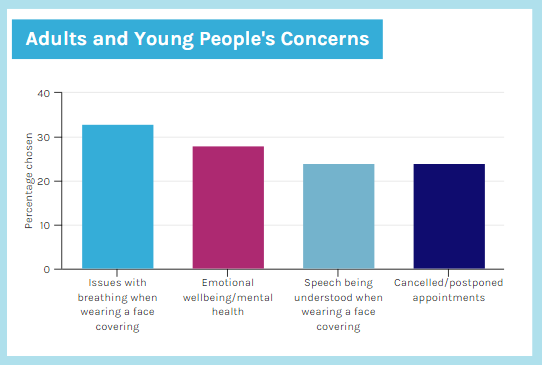
Remote Cleft Care
To better understand how patients and their families have found the rapid shift towards remote cleft care, we asked respondents to tell us what they thought of the different services they’ve accessed.
Of our respondents, only 24% had accessed online cleft care during lockdown. Most of these were Speech and Language Therapy sessions with the Cleft Team (34%), surgery consultations (34%), or Cleft Nurse appointments (21%).
It was heartening to see that overall, people had had a positive experience of remote cleft care. Respondents told us that appointments were generally comfortable and straightforward, easy to arrange and attend, and slightly fewer people agreed they were just as effective as in-person appointments.
We know remote appointments have benefits as well as drawbacks. People, especially children, are usually more relaxed at home, and can find video calls less intimidating than a full clinic in the hospital. They’re also much easier and cheaper for those in rural areas or without reliable transport, aside from the occasional problem with bad internet connections. On the other hand, some people find video calling awkward and impersonal, especially those who have never met their Cleft Team in person, and there are a number of issues which can negatively affect someone’s experiences.
When we asked about what these issues were, the most common were finding time at home without noise (12%) or interruptions (19%), balancing childcare (19%), disliking videoconferencing (13%), and a number of issues reported with software and devices used.
CLAPA’s Response
For this question in particular we received a lot of helpful feedback about how these appointments feel from the other side, and we’ve passed parts of this feedback onto Cleft Teams. We’re also looking at getting some information together about online appointments in partnership with Cleft Teams to help people prepare for these and make the most of them.
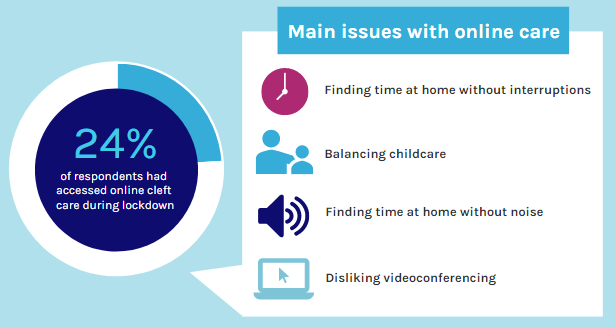
Your Support Network
To see how things might have changed since last year, we repeated a few questions which appeared on a 2019 survey about support services.
When asked if they felt they had access to a support network for issues around cleft lip and palate, 53% said ‘yes’, compared to 71% last year. The remaining responses in both surveys were roughly equal between people who did want a support network, and those who didn’t feel they needed one.
We asked respondents to tell us a bit more about their answer, and got many detailed replies.
Most people who had a support network mentioned direct support from CLAPA (such as the Peer and Parent Support Service), the Facebook Groups, and support from Cleft Teams as being important to them.
Many of those who said they wanted a support network provided some insightful replies about how they felt left out by existing services, or didn’t know how to access them. A number of responses pointed to lockdown as a big barrier, especially for those who had joined the cleft community during this time and felt they’d have benefited with more face-to-face support which simply wasn’t possible.
There was some interesting feedback about volunteering, especially from those who had been disappointed to not be able to join CLAPA as a volunteer. There are a few reasons why we can’t accept everyone, no matter how perfect they might be for a role, and chief amongst them is we just don’t have the capacity to support any more volunteers in the way we think we should. Namely, with training, development, supervision, and ongoing support. We’ll look at putting up more information about this, including when and where we’re actively recruiting, and offering alternative ways for people to get involved and use their skills.
Of those that said they didn’t feel they needed a support network, it was great to see that many said they were pleased to know CLAPA was there for when they might need it in the future, but felt they didn’t need any additional help at the moment.
We asked people how they would prefer to access support once things went back to ‘normal’, and the most popular responses were through the Cleft Team (43%), through social media (36%), CLAPA events (31%), and the CLAPA website (30%). Fewer people wanted to continue using online events in particular (17%).
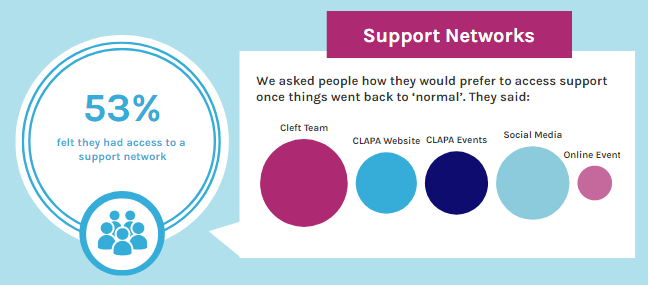
Online Events
For the foreseeable future, online events are the only way we can safely deliver opportunities for people to come together, and it’s important to us we’re putting our limited resources towards the things that our community want the most.
We asked people what kinds of events they were interested in, and the top responses were:
- Discussions on certain areas of the treatment pathway (e.g. a particular surgery), focusing on experiences of patients and families (33%)
- Discussions on certain areas of the treatment pathway (e.g. a particular surgery), focusing on facts from cleft health professionals (33%)
- Children’s activity for your child’s age group (31%)
- Research and other factual Q&As (31%)
- Coffee social for people in a similar position to you (e.g. expectant parents) (25%)
- Family quiz (23%)
Thankfully, these are all events we’re already delivering or have plans to deliver! Check our events page for the most up to date listings.
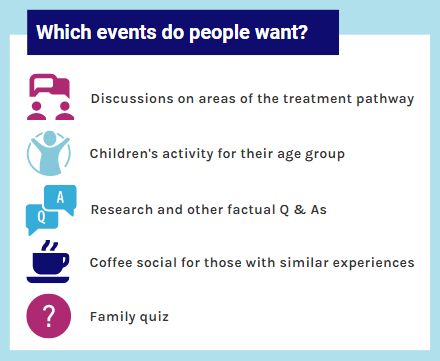
We asked what people wanted to get (or wanted their child to get) out of these events, and the top answers were:
- Sharing experiences with others in a similar position (65%)
- Hearing from and/or seeing others in a similar position (58%)
- Making friends and creating a cleft support network (51%)
- Increasing general understanding and knowledge about cleft (48%)
- Having fun / socialising (47%)
- Supporting CLAPA’s work (42%)
- Having particular questions and concerns answered (37%)
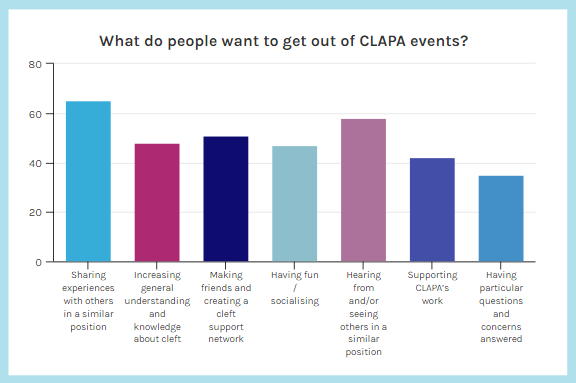
CLAPA’s Response
We’ll keep these in mind when we’re organising new events to make sure we’re meeting these needs as best we can. Moving forward, if you attend any Zoom events such as Coffee Clubs, it would be extremely helpful if you could fill in our feedback forms to let us know what you have and haven’t enjoyed. Feedback like this has already been instrumental in developing these events, and your voice will continue to guide us moving forward.
We also think it’s important that people who can’t attend events for any reason don’t miss out on the valuable discussions that take place within. In some cases, like with our Q&As, we can record and post these videos for people to watch afterwards, but even this may not be enough, as some of the videos involve a significant time commitment. Because of this, we’re looking into ways to capture the information shared during these events so it can be accessed by everyone who might benefit from it.
Final Question
As the final question, we asked respondents if there was anything else they wanted to tell us, and unsurprisingly we got a big mix of answers! Some of these are directly relevant to what we’re doing now and will be incorporated into our plans, others are interesting thoughts about gaps in our services which we hope to address more in the future.
We’d like to say a HUGE thank you to everyone who took part in this survey! Surveys like this directly impact our plans and how we develop our services, and are a fantastic way for you to influence what we do.
As we continue to move forward into an uncertain future, it’s likely we’ll post more surveys like this to take the pulse of the cleft community on a variety of issues. Please do fill these out when you can, and encourage others to do the same – the more people who respond, the more we can do with the results!
In the meantime…
There are new projects all the time looking for the input of the cleft community! Check our research pages to find a list of the latest projects looking for participants, and add your voice.
Our inbox [email protected] is always open for your questions, comments and suggestions. If you’d prefer to provide these anonymously, you can do so using our contact form.


